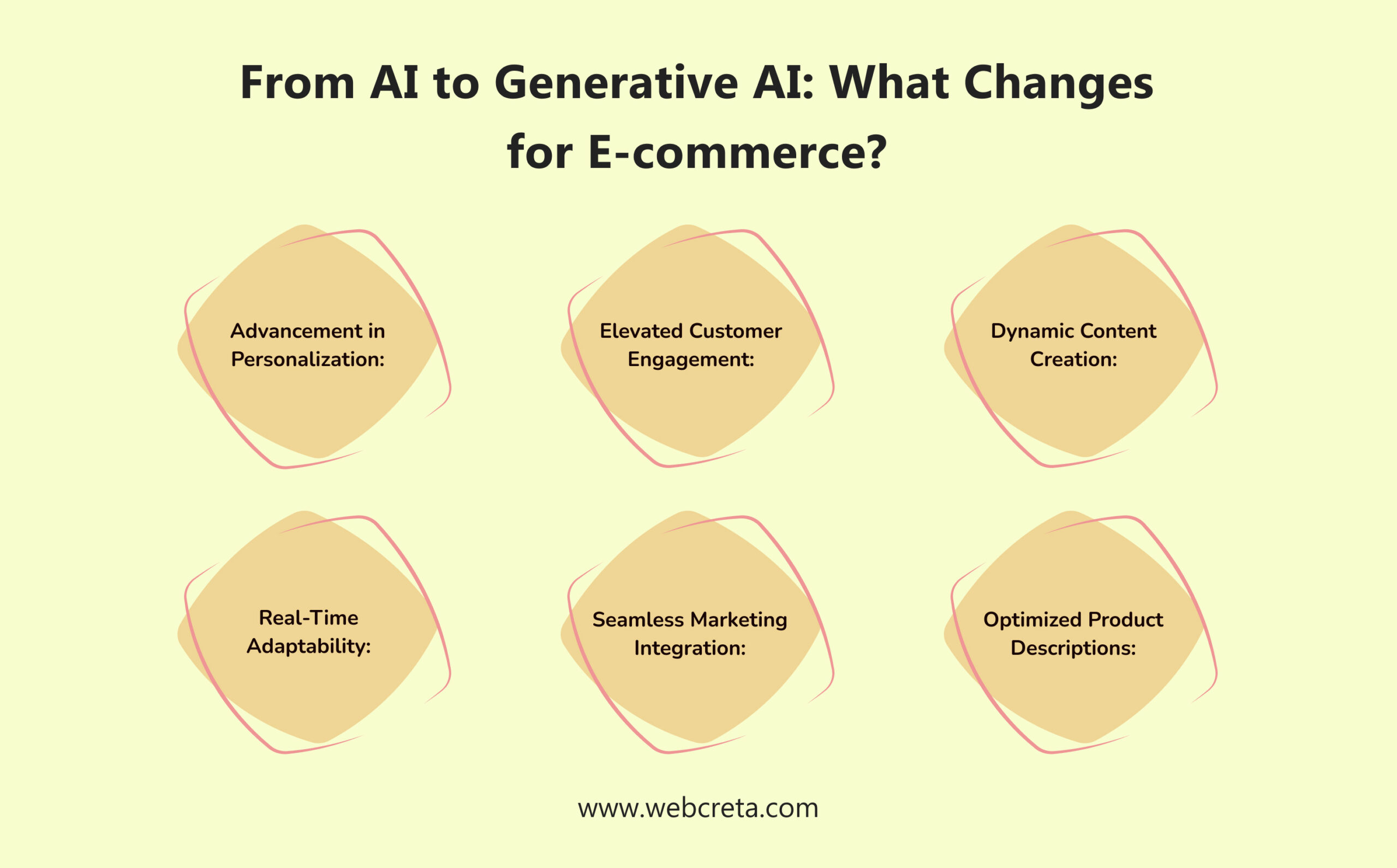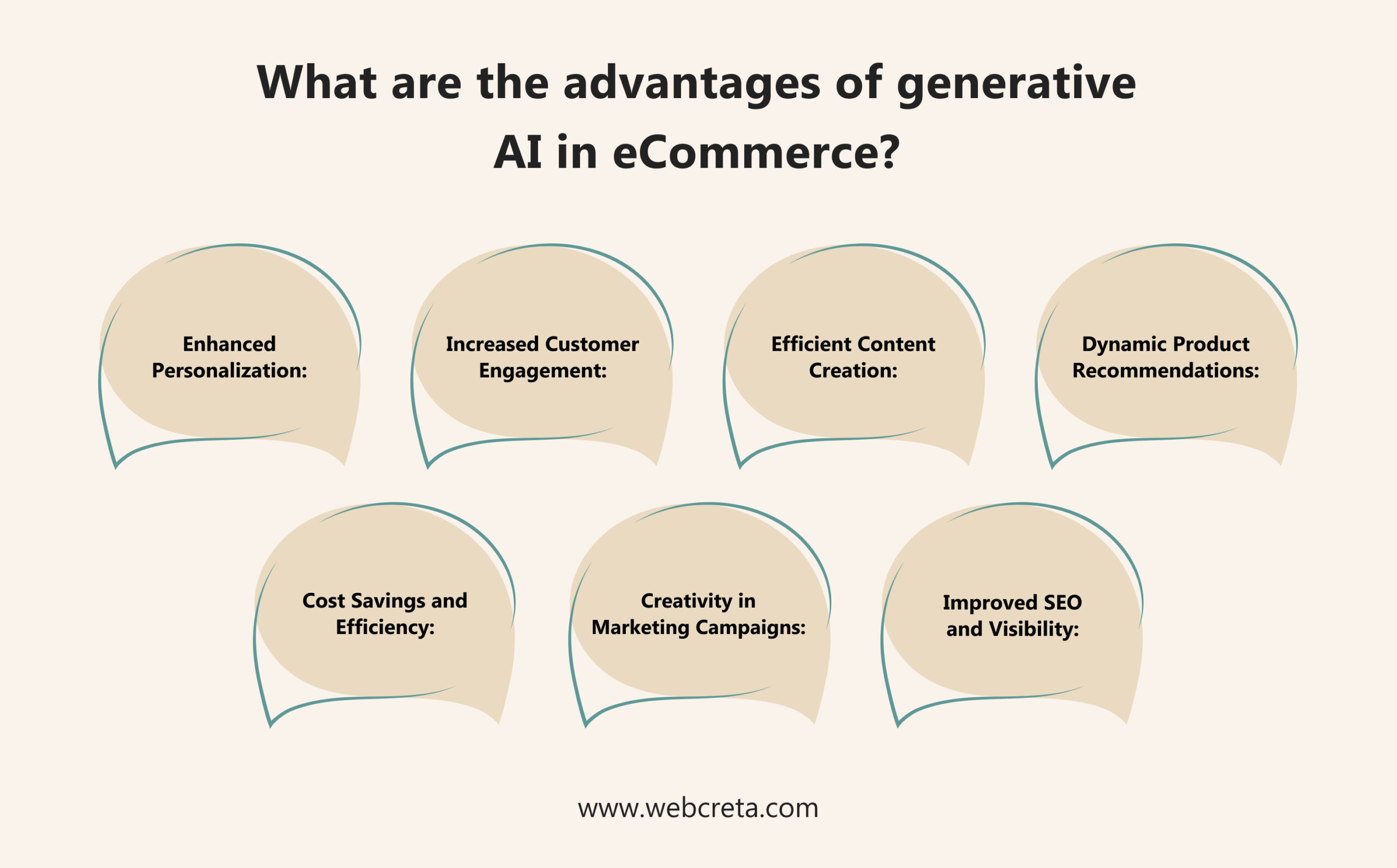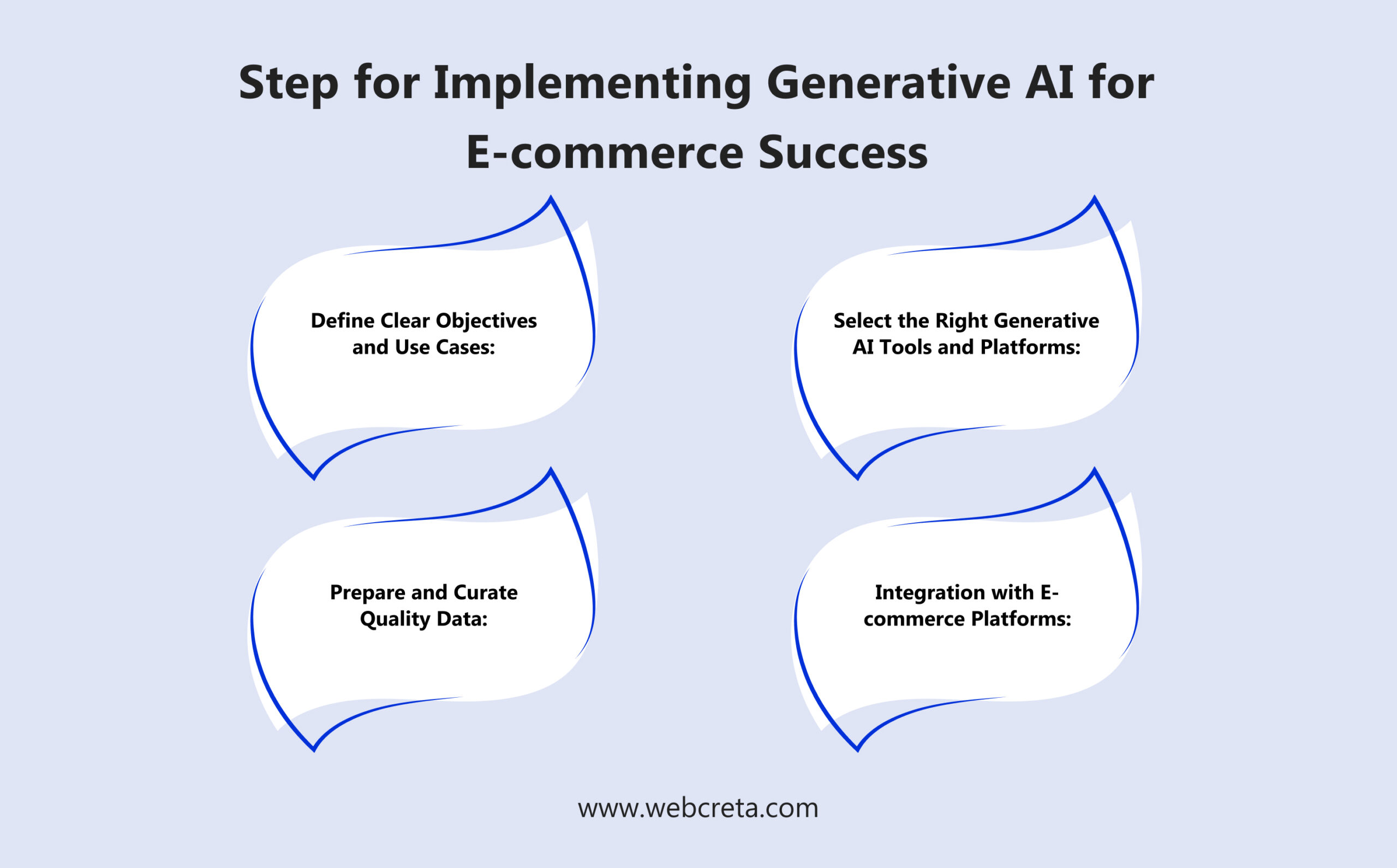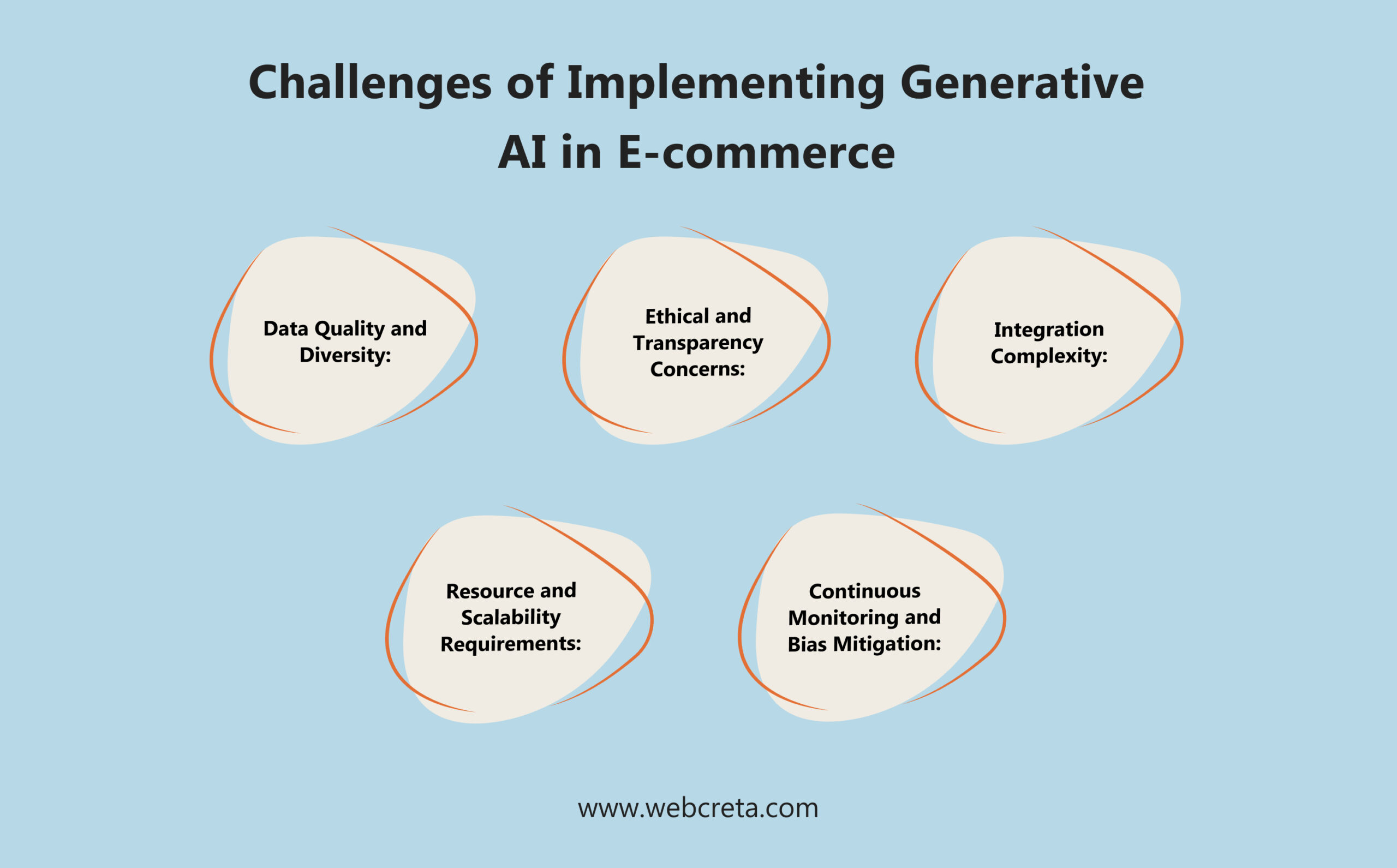How to Use Generative AI in eCommerce to Increase Sales

Table of Contents
Introduction
Have you ever wondered about the invisible architects shaping the future of e-commerce? Enter Generative Artificial Intelligence (AI), a set of algorithms not bound by rules but driven by possibilities. Generative Artificial Intelligence (AI) stands at the forefront of this evolution, promising not just incremental improvements, but a paradigm shift in the dynamics of online retail. In this blog, we explain the mysteries behind generative AI and its profound impact on boosting profits and sales in the competitive e-commerce landscape. Find out how utilizing this revolutionary technology may take your internet business to previously unheard-of levels, from its basic principles to its actual use.
What is generative artificial intelligence (AI)?
Generative Artificial Intelligence (AI) is a cutting-edge technology that has revolutionized the field of artificial intelligence by enabling the creation of various types of content, such as text, imagery, audio, and synthetic data. This innovative AI category utilizes deep-learning models to generate high-quality content based on the data they were trained on. Generative AI algorithms work by producing new outputs through techniques like generative adversarial networks. This technology, also known as GenAI or GAI, has been instrumental in generating text, images, and other data autonomously, leading to advancements in fields like content creation, personalized marketing, and creative design.
From AI to Generative AI: What Changes for E-commerce?

I) Advancement in Personalization:
Generative AI takes e-commerce personalization to the next level by creating real-time, dynamic content tailored to individual customer preferences, surpassing the capabilities of traditional AI that relies on historical data.
II) Elevated Customer Engagement:
Going beyond traditional AI, generative AI actively engages customers through creative content generation. This innovation fosters a deeper connection, leading to increased interaction and conversion rates, enhancing the overall customer experience.
III) Dynamic Content Creation:
Generative AI brings a creative dimension to e-commerce by autonomously generating diverse content, from compelling product descriptions to visually appealing images. This dynamic content enriches the online shopping experience, making it more memorable and immersive.
IV) Real-Time Adaptability:
Generative AI excels in real-time adaptability, continuously learning from new data to ensure that recommendations and content remain relevant. This feature creates a dynamic and responsive user experience, setting it apart from traditional AI systems.
V) Seamless Marketing Integration:
Seamlessly integrating into e-commerce marketing strategies, generative AI extends its personalized content generation to marketing campaigns. This strategic use enhances the effectiveness of promotional efforts, leading to improved conversion rates and customer loyalty.
VI) Optimized Product Descriptions:
Unlike traditional AI, generative AI dynamically optimizes and tailors product descriptions. It captures the essence of products in a way that resonates with individual customers, providing a nuanced and persuasive representation beyond static content.
What are the advantages of generative AI in eCommerce?

I) Enhanced Personalization:
Generative AI brings a new level of personalization to e-commerce by creating dynamic and tailored content. From personalized product recommendations to individualized marketing messages, customers experience a more engaging and relevant online journey.
II) Increased Customer Engagement:
The creative content generated by generative AI captivates customers, leading to increased engagement. This heightened interaction can translate into longer site visits, more click-throughs, and ultimately, improved conversion rates for e-commerce businesses.
III) Efficient Content Creation:
Generative AI automated content creation processes, significantly reducing the time and resources needed for tasks such as generating product descriptions and creating visual content. This efficiency enables e-commerce businesses to maintain a dynamic online presence without the burden of manual content creation.
IV) Dynamic Product Recommendations:
Traditional AI relies on historical data for product recommendations, while generative AI considers real-time customer behavior and external trends. This leads to more dynamic and diverse product recommendations, enhancing the chances of satisfying customers and driving sales.
V) Cost Savings and Efficiency:
The automation capabilities of generative AI contribute to cost savings by streamlining various aspects of e-commerce operations. With reduced manual intervention in content creation and marketing, businesses can optimize resources and focus on strategic growth initiatives.
VI) Creativity in Marketing Campaigns:
Generative AI lends a creative edge to marketing campaigns by autonomously generating personalized and compelling content. This creativity not only attracts customer attention but also allows for more effective and targeted marketing strategies, boosting the overall impact of campaigns.
VII) Improved SEO and Visibility:
The dynamic and optimized content generated by generative AI contributes to improved search engine optimization (SEO). This, in turn, enhances the visibility of e-commerce websites, making them more discoverable to potential customers searching for products online.
Step for Implementing Generative AI for E-commerce Success

I) Define Clear Objectives and Use Cases:
Begin by clearly defining the objectives and specific use cases for implementing generative AI in your e-commerce strategy. Whether it’s enhancing personalization, optimizing content creation, or improving product recommendations, having well-defined goals will guide the implementation process.
II) Select the Right Generative AI Tools and Platforms:
Choose generative AI tools and platforms that align with your e-commerce needs. Consider factors such as ease of integration, scalability, and the specific features required for your objectives.
III) Prepare and Curate Quality Data:
The success of generative AI relies on the quality of the data it’s trained on. Ensure your datasets are comprehensive, clean, and representative of your target audience. Curate data that captures diverse customer behaviors, preferences, and trends to enhance the generative AI model’s effectiveness.
IV) Integration with E-commerce Platforms:
Integrate generative AI seamlessly into your e-commerce platforms. Collaborate with your IT team or external vendors to ensure a smooth integration process that doesn’t disrupt the overall functionality of your online store. Conduct thorough testing to validate the generative AI features before deploying them live.
Challenges of Implementing Generative AI in E-commerce

I) Data Quality and Diversity:
Ensuring the quality and diversity of training data is a primary challenge. Biased or incomplete datasets can lead to inaccuracies and limitations in the generated content, impacting the effectiveness of the generative AI models.
II) Ethical and Transparency Concerns:
The implementation of generative AI raises ethical considerations, particularly regarding unintentional generation of inappropriate content or manipulation of user preferences. Maintaining transparency in how AI algorithms influence user experiences is crucial for ethical AI implementation.
III) Integration Complexity:
Integrating generative AI into existing e-commerce platforms can be complex. Compatibility issues, technical challenges, and potential disruptions to the user experience during integration need to be carefully managed to ensure a seamless implementation.
IV) Resource and Scalability Requirements:
As e-commerce businesses grow, the demand on generative AI models increases. Ensuring scalability and managing the resource requirements for training and deployment are challenges that need to be addressed for sustainable implementation.
V) Continuous Monitoring and Bias Mitigation:
Continuous monitoring is essential to identify and address biases that may emerge in generative AI models over time. Proactive measures to mitigate biases and prevent unintended consequences are crucial for responsible AI implementation in the e-commerce landscape.
Conclusion – The Role of Generative AI in E-commerce
In conclusion, Generative AI’s role in E-commerce transcends conventional boundaries, ushering in a new era of innovation and efficiency. From crafting personalized content to revolutionizing marketing strategies, its impact is undeniable. As businesses navigate the dynamic landscape of online retail, Generative AI emerges as a powerful ally, offering unparalleled insights, creativity, and adaptability.
Boost your online visibility with Webcreta, the go-to resource for using generative AI to the fullest. Contact us now for innovative tactics and specialized solutions, and start along a successful and innovative path.



